Criminal Justice (Mutual Assistance) Act 2008
F178[SCHEDULE 5A
Text of 2005 Framework Decision
COUNCIL FRAMEWORK DECISION 2005/214/JHA
of 24 February 2005
on the application of the principle of mutual recognition to financial penalties
THE COUNCIL OF THE EUROPEAN UNION,
Having regard to the Treaty on European Union, and in particular Articles 31(a) and 34(2)(b) thereof,
Having regard to the initiative of the United Kingdom of Great Britain and Northern Ireland, the French Republic and the Kingdom of Sweden1,
Having regard to the opinion of the European Parliament2,
Whereas:
(1) The European Council meeting in Tampere on 15 and 16 October 1999 endorsed the principle of mutual recognition, which should become the cornerstone of judicial cooperation in both civil and criminal matters within the Union.
(2) The principle of mutual recognition should apply to financial penalties imposed by judicial or administrative authorities for the purpose of facilitating the enforcement of such penalties in a Member State other than the State in which the penalties are imposed.
(3) On 29 November 2000 the Council, in accordance with the Tampere conclusions, adopted a programme of measures to implement the principle of mutual recognition of decisions in criminal matters3, giving priority to the adoption of an instrument applying the principle of mutual recognition to financial penalties (measure 18).
(4) This Framework Decision should also cover financial penalties imposed in respect of road traffic offences.
(5) This Framework Decision respects fundamental rights and observes the principles recognised by Article 6 of the Treaty and reflected by the Charter of Fundamental Rights of the European Union4, in particular Chapter VI thereof. Nothing in this Framework Decision may be interpreted as prohibiting refusal to execute a decision when there are reasons to believe, on the basis of objective elements, that the financial penalty has the purpose of punishing a person on the grounds of his or her sex, race, religion, ethnic origin, nationality, language, political opinions or sexual orientation, or that that person’s position may be prejudiced for any of these reasons.
(6) This Framework Decision does not prevent a Member State from applying its constitutional rules relating to due process, freedom of association, freedom of the press and freedom of expression in other media,
HAS ADOPTED THIS FRAMEWORK DECISION:
Article 1
Definitions
For the purposes of this Framework Decision:
(a) "decision" shall mean a final decision requiring a financial penalty to be paid by a natural or legal person where the decision was made by:
(i) a court of the issuing State in respect of a criminal offence under the law of the issuing State;
(ii) an authority of the issuing State other than a court in respect of a criminal offence under the law of the issuing State, provided that the person concerned has had an opportunity to have the case tried by a court having jurisdiction in particular in criminal matters;
(iii) an authority of the issuing State other than a court in respect of acts which are punishable under the national law of the issuing State by virtue of being infringements of the rules of law, provided that the person concerned has had an opportunity to have the case tried by a court having jurisdiction in particular in criminal matters;
(iv) a court having jurisdiction in particular in criminal matters, where the decision was made regarding a decision as referred to in point (iii) ;
(b) "financial penalty" shall mean the obligation to pay:
(i) a sum of money on conviction of an offence imposed in a decision;
(ii) compensation imposed in the same decision for the benefit of victims, where the victim may not be a civil party to the proceedings and the court is acting in the exercise of its criminal jurisdiction;
(iii) a sum of money in respect of the costs of court or administrative proceedings leading to the decision;
(iv) a sum of money to a public fund or a victim support organisation, imposed in the same decision.
A financial penalty shall not include:
— orders for the confiscation of instrumentalities or proceeds of crime,
— orders that have a civil nature and arise out of a claim for damages and restitution and which are enforceable in accordance with Council Regulation (EC) No 44/2001 of 22 December 2000 on jurisdiction and the recognition and enforcement of judgments in civil and commercial matters5;
(c) "issuing State" shall mean the Member State in which a decision within the meaning of this Framework Decision was delivered;
(d) "executing State" shall mean the Member State to which a decision has been transmitted for the purpose of enforcement.
Article 2
Determination of the competent authorities
1. Each Member State shall inform the General Secretariat of the Council which authority or authorities, under its national law, are competent according to this Framework Decision, when that Member State is the issuing State or the executing State.
2. Notwithstanding Article 4, each Member State may designate, if it is necessary as a result of the organisation of its internal system, one or more central authorities responsible for the administrative transmission and reception of the decisions and to assist the competent authorities.
3. The General Secretariat of the Council shall make the information received available to all Member States and the Commission.
Article 3
Fundamental rights
This Framework Decision shall not have the effect of amending the obligation to respect fundamental rights and fundamental legal principles as enshrined in Article 6 of the Treaty.
Article 4
Transmission of decisions and recourse to the central authority
1. A decision, together with a certificate as provided for in this Article, may be transmitted to the competent authorities of a Member State in which the natural or legal person against whom a decision has been passed has property or income, is normally resident or, in the case of a legal person, has its registered seat.
2. The certificate, the standard form for which is given in the Annex, must be signed, and its contents certified as accurate, by the competent authority in the issuing State.
3. The decision or a certified copy of it, together with the certificate, shall be transmitted by the competent authority in the issuing State directly to the competent authority in the executing State by any means which leaves a written record under conditions allowing the executing State to establish its authenticity. The original of the decision, or a certified copy of it, and the original of the certificate, shall be sent to the executing State if it so requires. All official communications shall also be made directly between the said competent authorities.
4. The issuing State shall only transmit a decision to one executing State at any one time.
5. If the competent authority in the executing State is not known to the competent authority in the issuing State, the latter shall make all necessary inquiries, including via the contact points of the European Judicial Network6 in order to obtain the information from the executing State.
6. When an authority in the executing State which receives a decision has no jurisdiction to recognise it and take the necessary measures for its execution, it shall, ex officio, transmit the decision to the competent authority and shall inform the competent authority in the issuing State accordingly.
7. The United Kingdom and Ireland, respectively, may state in a declaration that the decision together with the certificate must be sent via its central authority or authorities specified by it in the declaration. These Member States may at any time by a further declaration limit the scope of such a declaration for the purpose of giving greater effect to paragraph 3. They shall do so when the provisions on mutual assistance of the Schengen Implementation Convention are put into effect for them. Any declaration shall be deposited with the General Secretariat of the Council and notified to the Commission.
Article 5
Scope
1. The following offences, if they are punishable in the issuing State and as they are defined by the law of the issuing State, shall, under the terms of this Framework Decision and without verification of the double criminality of the act, give rise to recognition and enforcement of decisions:
— participation in a criminal organisation,
— terrorism,
— trafficking in human beings,
— sexual exploitation of children and child pornography,
— illicit trafficking in narcotic drugs and psychotropic substances,
— illicit trafficking in weapons, munitions and explosives,
— corruption,
— fraud, including that affecting the financial interests of the European Communities within the meaning of the Convention of 26 July 1995 on the protection of the European Communities' financial interests,
— laundering of the proceeds of crime,
— counterfeiting currency, including of the euro,
— computer-related crime,
— environmental crime, including illicit trafficking in endangered animal species and in endangered plant species and varieties,
— facilitation of unauthorised entry and residence,
— murder, grievous bodily injury,
— illicit trade in human organs and tissue,
— kidnapping, illegal restraint and hostage-taking,
— racism and xenophobia,
— organised or armed robbery,
— illicit trafficking in cultural goods, including antiques and works of art,
— swindling,
— racketeering and extortion,
— counterfeiting and piracy of products,
— forgery of administrative documents and trafficking therein,
— forgery of means of payment,
— illicit trafficking in hormonal substances and other growth promoters,
— illicit trafficking in nuclear or radioactive materials,
— trafficking in stolen vehicles,
— rape,
— arson,
— crimes within the jurisdiction of the International Criminal Court,
— unlawful seizure of aircraft/ships,
— sabotage,
— conduct which infringes road traffic regulations, including breaches of regulations pertaining to driving hours and rest periods and regulations on hazardous goods,
— smuggling of goods,
— infringements of intellectual property rights,
— threats and acts of violence against persons, including violence during sport events,
— criminal damage,
— theft,
— offences established by the issuing State and serving the purpose of implementing obligations arising from instruments adopted under the EC Treaty or under Title VI of the EU Treaty.
2. The Council may decide to add other categories of offences to the lists in paragraph 1 at any time, acting unanimously after consultation of the European Parliament under the conditions laid down in Article 39(1) of the EU Treaty.
The Council shall consider, in the light of the report submitted to it pursuant to Article 20(5), whether the list should be extended or amended. The Council shall consider the issue further at a later stage on the basis of a report on the practical application of the Framework Decision established by the Commission within 5 years after the date mentioned in Article 20(1).
3. For offences other than those covered by paragraph 1, the executing State may make the recognition and execution of a decision subject to the condition that the decision is related to conduct which would constitute an offence under the law of the executing State, whatever the constituent elements or however it is described.
Article 6
Recognition and execution of decisions
The competent authorities in the executing State shall recognise a decision which has been transmitted in accordance with Article 4 without any further formality being required and shall forthwith take all the necessary measures for its execution, unless the competent authority decides to invoke one of the grounds for non-recognition or non-execution provided for in Article 7.
Article 7
Grounds for non-recognition and non-execution
1. The competent authorities in the executing State may refuse to recognise and execute the decision if the certificate provided for in Article 4 is not produced, is incomplete or manifestly does not correspond to the decision.
2. The competent authority in the executing State may also refuse to recognise and execute the decision if it is established that:
(a) decision against the sentenced person in respect of the same acts has been delivered in the executing State or in any State other than the issuing or the executing State, and, in the latter case, that decision has been executed;
(b) in one of the cases referred to in Article 5(3), the decision relates to acts which would not constitute an offence under the law of the executing State;
(c) the execution of the decision is statute-barred according to the law of the executing State and the decision relates to acts which fall within the jurisdiction of that State under its own law.
(d) the decision relates to acts which:
(i) are regarded by the law of the executing State as having been committed in whole or in part in the territory of the executing State or in a place treated as such, or
(ii) have been committed outside the territory of the issuing State and the law of the executing State does not allow prosecution for the same offences when committed outside its territory;
(e) there is immunity under the law of the executing State, which makes it impossible to execute the decision;
(f) the decision has been imposed on a natural person who under the law of the executing State due to his or her age could not yet have been held criminally liable for the acts in respect of which the decision was passed;
(g) according to the certificate provided for in Article 4, the person concerned
(i) in case of a written procedure was not, in accordance with the law of the issuing State, informed personally or via a representative, competent according to national law, of his right to contest the case and of time limits of such a legal remedy, or
(ii) did not appear personally, unless the certificate states:
— that the person was informed personally, or via a representative, competent according to national law, of the proceedings in accordance with the law of the issuing State, or
— that the person has indicated that he or she does not contest the case;
(h) the financial penalty is below EUR 70 or the equivalent to that amount.
3. In cases referred to in paragraphs 1 and 2(c) and (g), before deciding not to recognise and to execute a decision, either totally or in part, the competent authority in the executing State shall consult the competent authority in the issuing State, by any appropriate means, and shall, where appropriate, ask it to supply any necessary information without delay.
Article 8
Determination of the amount to be paid
1. Where it is established that the decision is related to acts which were not carried out within the territory of the issuing State, the executing State may decide to reduce the amount of the penalty enforced to the maximum amount provided for acts of the same kind under the national law of the executing State, when the acts fall within the jurisdiction of that State.
2. The competent authority of the executing State shall, if necessary, convert the penalty into the currency of the executing State at the rate of exchange obtaining at the time when the penalty was imposed.
Article 9
Law governing enforcement
1. Without prejudice to paragraph 3 of this Article, and to Article 10, the enforcement of the decision shall be governed by the law of the executing State in the same way as a financial penalty of the executing State. The authorities of the executing State alone shall be competent to decide on the procedures for enforcement and to determine all the measures relating thereto, including the grounds for termination of enforcement.
2. In the case where the sentenced person is able to furnish proof of a payment, totally or in part, in any State, the competent authority of the executing State shall consult the competent authority of the Issuing State in the way provided for in Article 7(3). Any part of the penalty recovered in whatever manner in any State shall be deducted in full from the amount, which is to be enforced in the executing State.
3. A financial penalty imposed on a legal person shall be enforced even if the executing State does not recognise the principle of criminal liability of legal persons.
Article 10
Imprisonment or other alternative sanction by way of substitution for non-recovery of the financial penalty
Where it is not possible to enforce a decision, either totally or in part, alternative sanctions, including custodial sanctions, may be applied by the executing State if its laws so provide in such cases and the issuing State has allowed for the application of such alternative sanctions in the certificate referred to in Article 4. The severity of the alternative sanction shall be determined in accordance with the law of the executing State, but shall not exceed any maximum level stated in the certificate transmitted by the issuing State.
Article 11
Amnesty, pardon, review of sentence
1. Amnesty and pardon may be granted by the issuing State and also by the executing State.
2. Without prejudice to the Article 10, only the issuing State may determine any application for review of the decision.
Article 12
Termination of enforcement
1. The competent authority of the issuing State shall forthwith inform the competent authority of the executing State of any decision or measure as a result of which the decision ceases to be enforceable or is withdrawn from the executing State for any other reason.
2. The executing State shall terminate enforcement of the decision as soon as it is informed by the competent authority of the issuing State of that decision or measure.
Article 13
Accrual of monies obtained from enforcement of decisions
Monies obtained from the enforcement of decisions shall accrue to the executing State unless otherwise agreed between the issuing and the executing State, in particular in the cases referred to in Article 1(b)(ii).
Article 14
Information from the executing State
The competent authority of the executing State shall without delay inform the competent authority of the issuing State by any means which leaves a written record:
(a) of the transmission of the decision to the competent authority, according to Article 4(6) ;
(b) of any decision not to recognise and execute a decision, according to Articles 7 or 20(3), together with the reasons for the decision;
(c) of the total or partial non-execution of the decision for the reasons referred to in Article 8, Article 9(1) and (2), and Article 11(1);
(d) of the execution of the decision as soon as the execution has been completed;
(e) of the application of alternative sanction, according to Article 10.
Article 15
Consequences of transmission of a decision
1. Subject to paragraph 2, the issuing State may not proceed with the execution of a decision transmitted pursuant to Article 4.
2. The right of execution of the decision shall revert to the issuing State:
(a) upon it being informed by the executing State of the total or partial non-execution or the non-recognition or the non-enforcement of the decision in the case of Article 7, with the exception of Article 7(2) (a), in the case of Article 11(1), and in the case of Article 20(3); or
(b) when the executing State has been informed by the issuing State that the decision has been withdrawn from the executing State pursuant to Article 12.
3. If, after transmission of a decision in accordance with Article 4, an authority of the issuing State receives any sum of money which the sentenced person has paid voluntarily in respect of the decision, that authority shall inform the competent authority in the executing State without delay. Article 9(2) shall apply.
Article 16
Languages
1. The certificate, the standard form for which is given in the Annex, must be translated into the official language or one of the official languages of the executing State. Any Member State may, either when this Framework Decision is adopted or at a later date, state in a declaration deposited with the General Secretariat of the Council that it will accept a translation in one or more other official languages of the Institutions of the Union.
2. The execution of the decision may be suspended for the time necessary to obtain its translation at the expense of the executing State.
Article 17
Costs
Member States shall not claim from each other the refund of costs resulting from application of this Framework Decision.
Article 18
Relationship with other agreements and arrangements
This Framework Decision shall not preclude the application of bilateral or multilateral agreements or arrangements between Member States in so far as such agreements or arrangements allow the prescriptions of this Framework Decision to be exceeded and help to simplify or facilitate further the procedures for the enforcement of financial penalties.
Article 19
Territorial application
This Framework Decision shall apply to Gibraltar.
Article 20
Implementation
1. Member States shall take the necessary measures to comply with the provisions of this Framework Decision by 22 March 2007.
2. Each Member State may for a period of up to five years from the date of entry into force of this Framework Decision limit its application to:
(a) decisions mentioned in Article 1(a) (i) and (iv) ; and/or
(b) with regard to legal persons, decisions related to conduct for which a European instrument provides for the application of the principle of liability of legal persons.
Any Member State that wants to make use of this paragraph, shall notify a declaration to that effect to the Secretary General of the Council upon the adoption of this Framework Decision. The declaration shall be published in the Official Journal of the European Union.
3. Each Member State may, where the certificate referred to in Article 4 gives rise to an issue that fundamental rights or fundamental legal principles as enshrined in Article 6 of the Treaty may have been infringed, oppose the recognition and the execution of decisions. The procedure referred to in Article 7(3) shall apply.
4. Any Member State may apply the principle of reciprocity in relation to any Member State making use of paragraph 2.
5. Member States shall transmit to the General Secretariat of the Council and to the Commission the text of the provisions transposing into their national law the obligations imposed on them under this Framework Decision. On the basis of a report established on the basis of this information by the Commission, the Council shall, no later than 22 March 2008, assess the extent to which Member States have complied with this Framework Decision.
6. The General Secretariat of the Council shall notify the Member States and the Commission of the declarations made pursuant to Articles 4(7) and 16.
7. Without prejudice to Article 35(7) of the Treaty, a Member State which has experienced repeated difficulties or lack of activity by another Member State in the mutual recognition and execution of decisions, which have not been solved through bilateral consultations, may inform the Council with a view to evaluating the implementation of this Framework Decision at Member State level.
8. Any Member State which during a calendar year has applied paragraph 3, shall in the beginning of the following calendar year inform the Council and the Commission of cases in which the grounds referred to in that provision for non-recognition or non-execution of a decision have been applied.
9. Within seven years after the entry into force of this Framework Decision, the Commission shall establish a report on the basis of the information received, accompanied by any initiatives it may deem appropriate. The Council shall on the basis of the report review this Article with a view to considering whether paragraph 3 shall be retained or replaced by a more specific provision.
Article 21
Entry into force
This Framework Decision shall enter into force on the day of its publication in the Official Journal of the European Union.
Done at Brussels, 24 February 2005.
For the Council
The President
N. SCHMIT
ANNEX
CERTIFICATE
referred to in Article 4 of Council Framework Decision 2005/214/JHA on the application of the principle of mutual recognition to financial penalties
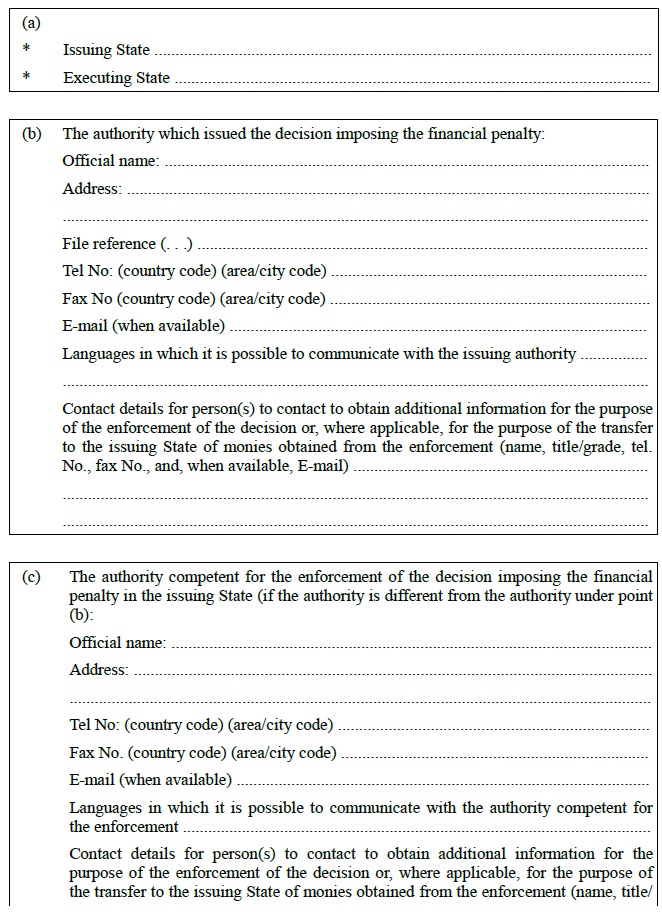
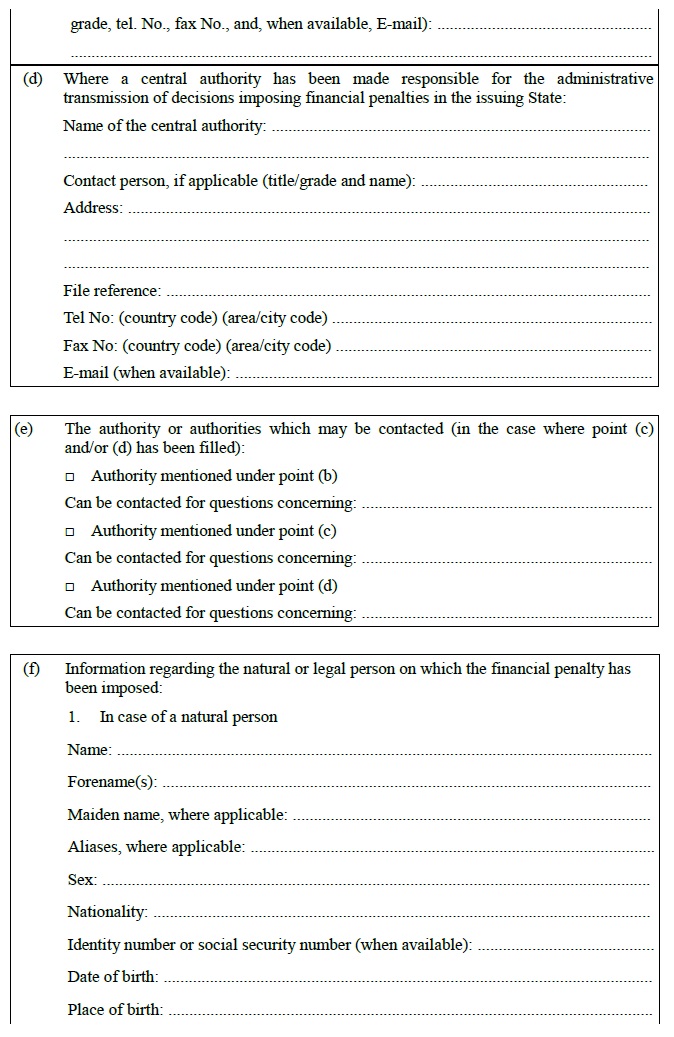
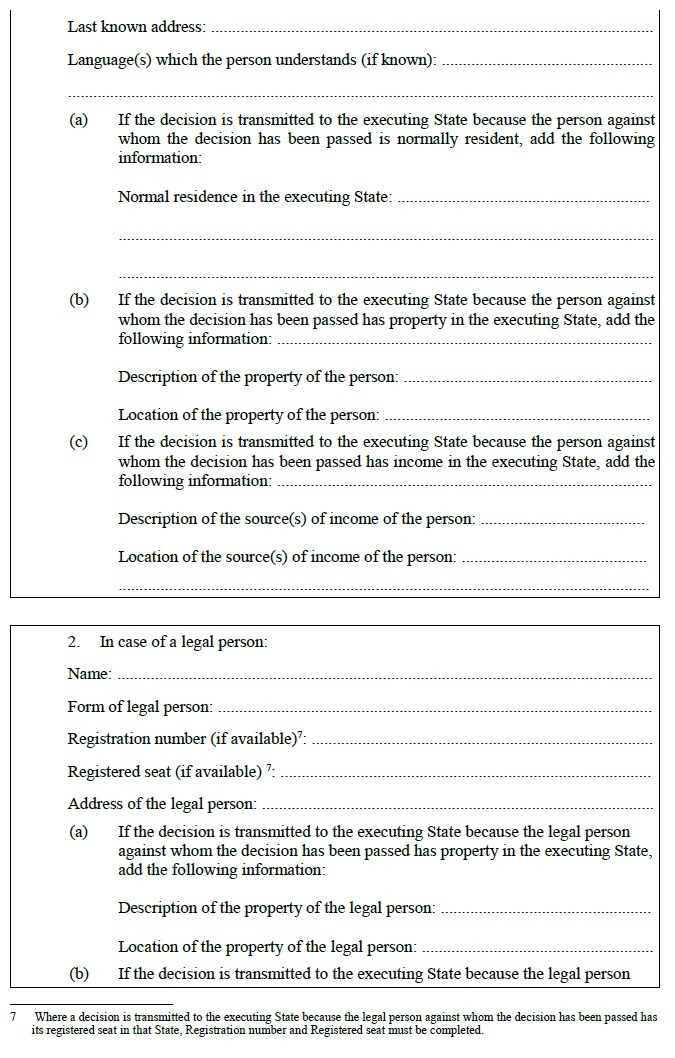
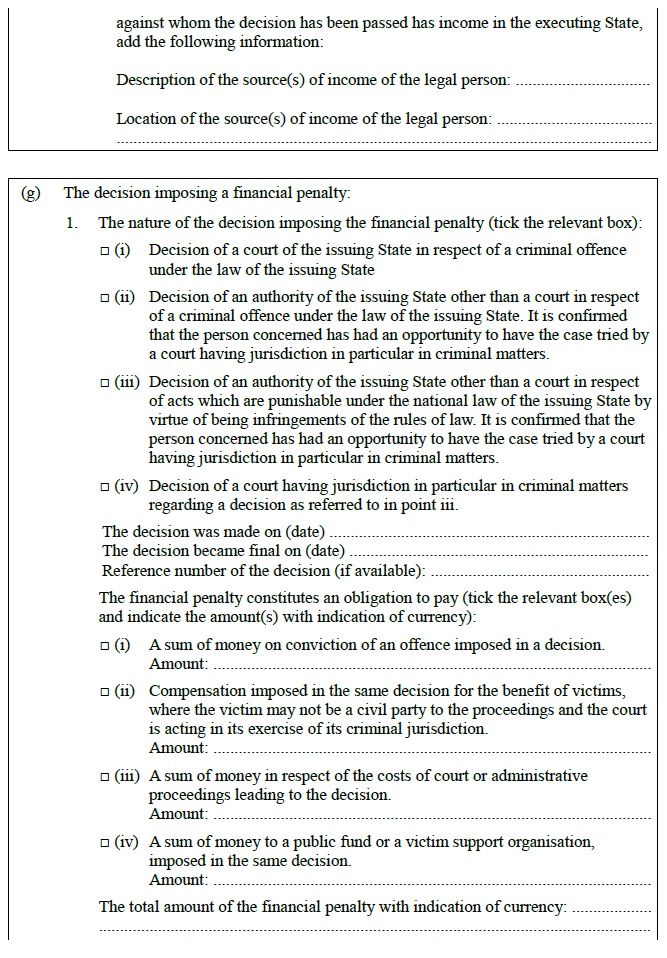
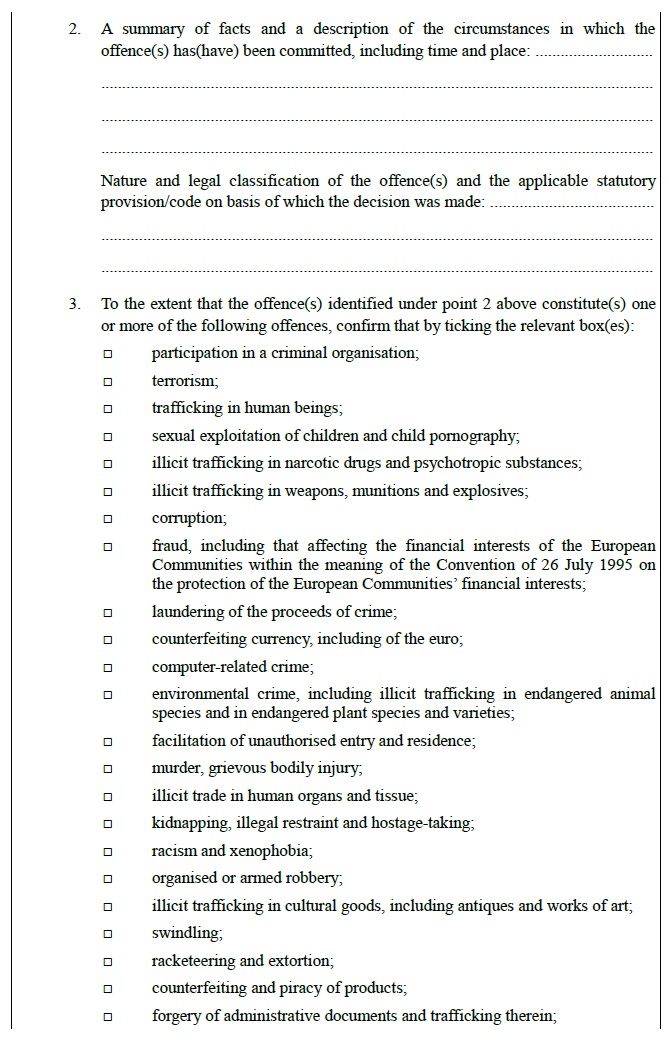
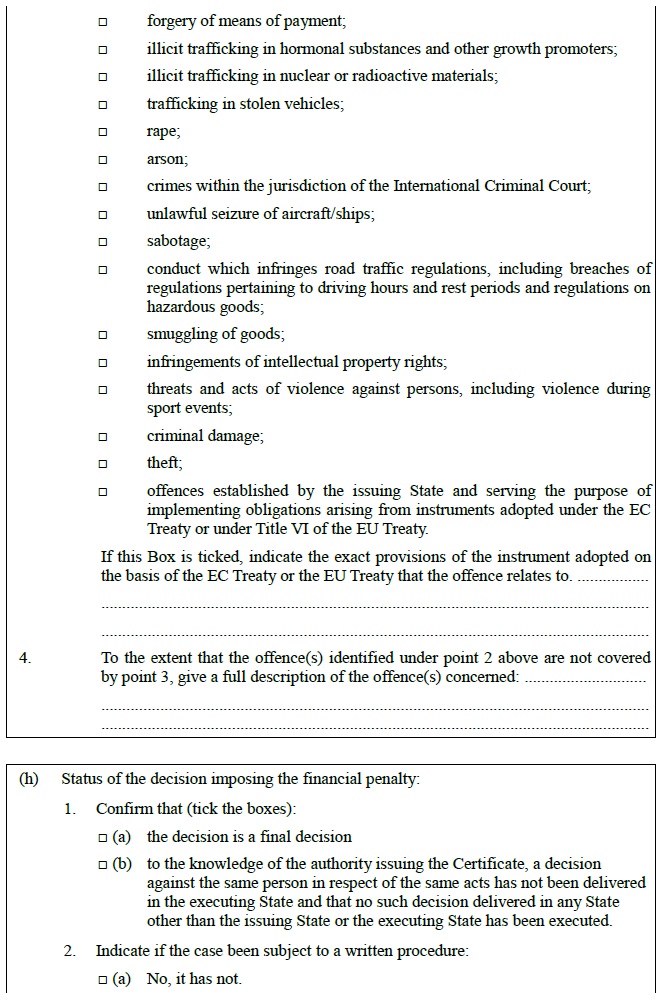
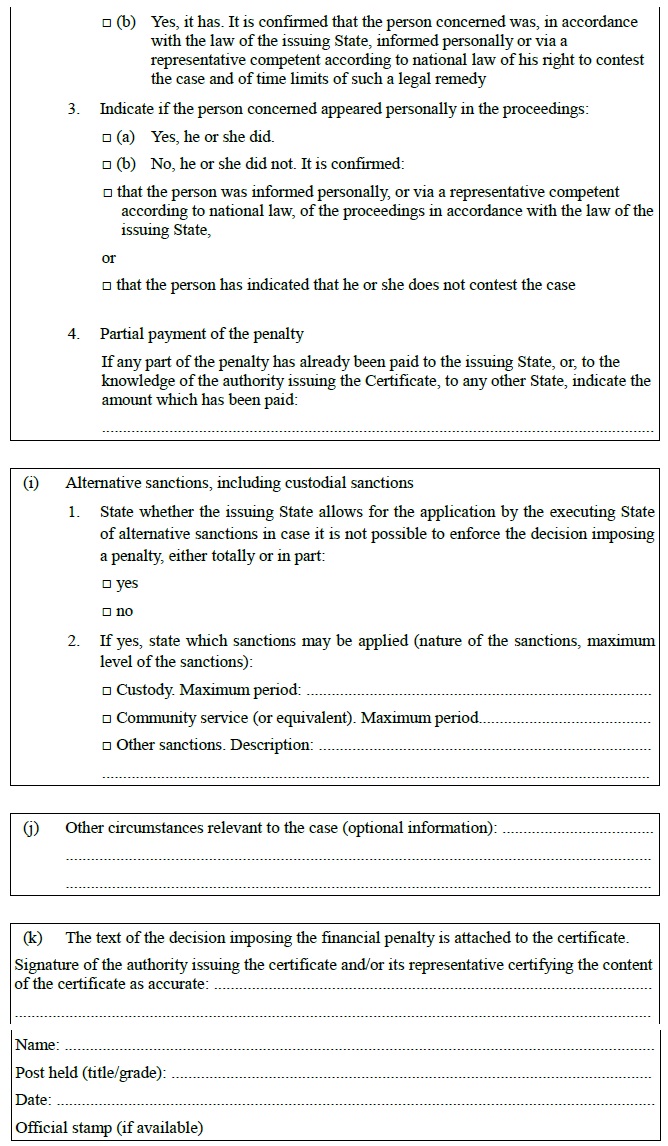 ]
]
Annotations
Amendments:
F178
Inserted (1.02.2016) by Criminal Justice (Mutual Assistance) (Amendment) Act 2015 (40/2016), s. 33(b) and sch. 2, S.I. No. 11 of 2016.

